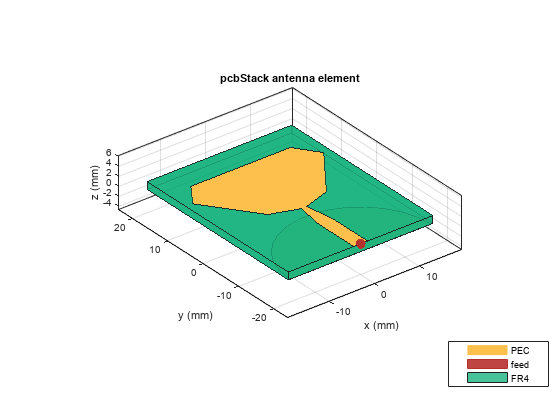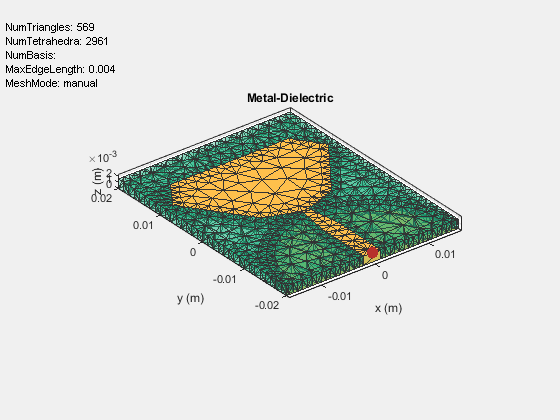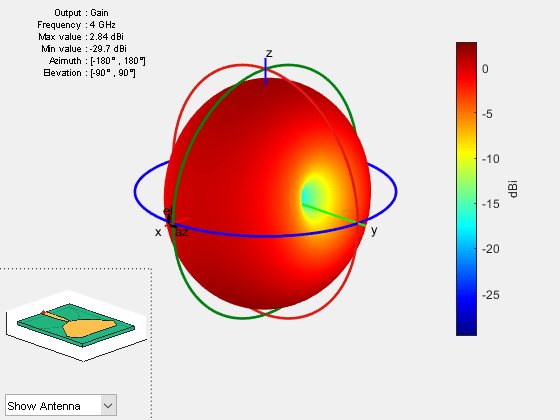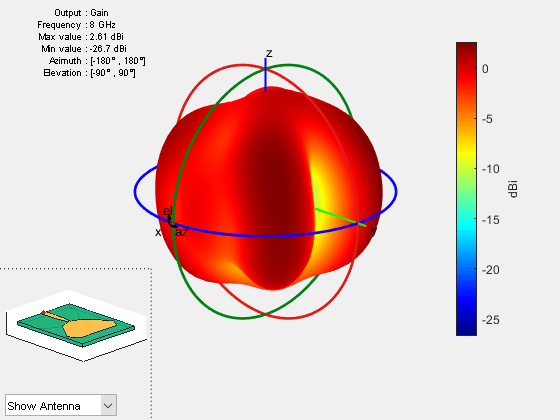Design and Analysis of Diamond-Shaped PCB Antenna for Ultra-Wideband Applications
This example shows how to create the diamond-shaped ultra-wideband (UWB) antenna described in [1] with a modified ground plane. It analyzes this antenna over an ultra-wide frequency range of 100 MHz to 15 GHz. UWB antennas are in high demand for various applications, such as wireless communications, medical imaging, radar, and indoor positioning. This demand is due to their ability to enable a high data transmission rate and low power consumption.
The planar diamond-shaped monopole antenna structure described in [1] achieves an ultra-wide bandwidth by using its features, such as its small size, ease of fabrication, low power consumption, and easy integration with the RF system. These features make the antenna a suitable candidate for use in compact devices.
In this example, you design the proposed antenna on a 1.6 mm FR4 substrate with a dielectric constant of 4.8 and loss tangent 0.026. This antenna consists of a diamond-shaped radiating patch, a modified feed line, and a semicircular ground plane. You then modify the conventional rectangular monopole antenna with beveled edges to form a diamond-shaped radiating patch.
Create Antenna Model
Define the ground plane length and width, board thickness, substrate, trace widths and lengths in meters.
% Ground plane dimensions gndL = 32e-3; gndW = 40e-3; % Board thickness h = 1.6e-3; R_gnd = 15.6e-3; % Substrate sub = dielectric('FR4'); sub.Thickness = h; sub.FrequencyModel = "DjordjevicSarkar"; % Trace widths Wf = 3.1e-3; Wf1 = 1.2e-3; W3 = 13e-3; W2 = 29e-3; W1 = 22e-3; % Trace lengths Lf = 10e-3; Lf1 = 6e-3; L3 = 2e-3; L2 = 11e-3; L1 = 5e-3;
Create the top-layer diamond-shaped antenna by passing the parameters and vertices to the antenna.Polygon object.
xver = round([-Wf/2 -Wf/2 -Wf1/2 -W3/2 -W2/2 -W1/2 W1/2 W2/2 W3/2 Wf1/2 Wf/2 Wf/2],12); yver = round( [-gndW/2 -gndW/2+Lf -gndW/2+Lf+Lf1 -gndW/2+Lf+Lf1+L3 -gndW/2+Lf+Lf1+L3+L2 ... -gndW/2+Lf+Lf1+L3+L2+L1 -gndW/2+Lf+Lf1+L3+L2+L1 -gndW/2+Lf+Lf1+L3+L2 ... -gndW/2+Lf+Lf1+L3 -gndW/2+Lf+Lf1 -gndW/2+Lf -gndW/2],12); zver = zeros(1,size(yver,2)); ver = [xver',yver',zver']; UWB_ant = antenna.Polygon(Vertices=ver);
Create the semicircular ground layer.
cir = antenna.Circle(Radius=R_gnd,Center=[0,-gndW/2]); rec = antenna.Rectangle(Length=gndL+2e-3,Width=R_gnd,Center=[0,-gndW/2-R_gnd/2]); rec1 = antenna.Rectangle(Length=0.5*R_gnd,Width=0.5*R_gnd,Center=[-gndL/2-(0.5*R_gnd)/2,-gndW/2+(0.5*R_gnd)/2]); rec2 = antenna.Rectangle(Length=0.5*R_gnd,Width=0.5*R_gnd,Center=[gndL/2+(0.5*R_gnd)/2,-gndW/2+(0.5*R_gnd)/2]); gnd = cir - (rec + rec1 + rec2);
Generate the UWB antenna model by using the pcbStack object with the assigned ground layer.
ant = pcbStack;
ant.BoardThickness = h;
ant.BoardShape = antenna.Rectangle(Length=gndL,Width=gndW);
ant.Layers = {UWB_ant,sub,gnd};
ant.FeedLocations = [0,-gndW/2,1,3];
ant.FeedDiameter = Wf/2;View the antenna.
figure
show(ant)
title("Diamond-Shaped Ultra-Wideband PCB Antenna")
Analyze S-parameters and Gain of Antenna
Mesh the structure using manual mesh mode with a maximum edge length of 0.004 m.
figure mesh(ant,MaxEdgeLength=0.004,MinEdgeLength=0.0015);

Use the sparameters function to calculate the of the structure in the frequency range of 0.1 GHz to 15 GHz.
spar = sparameters(ant,linspace(0.1e9,15e9,70)); figure rfplot(spar);

The UWB diamond-shaped antenna exhibits a Passband behavior in the frequency range of 2.5 GHz to 13.5 GHz with a lower than -10 dB.
Analyze the radiation pattern of the Wideband antenna at 4 GHz, 8 GHz, and 13.5 GHz frequencies that are within the analysis range.
figure
pattern(ant,4e9,Type="gain");
figure
pattern(ant,8e9,Type="gain");
figure
pattern(ant,13.5e9,Type="gain");
The proposed antenna exhibits stable radiation characteristics.
Conclusion
The diamond-shaped antenna achieves the enhanced ultra-wide bandwidth, in which the UWB frequency spectrum covers the range from 3.1 GHz to 10.6 GHz, with stable radiation characteristics. Because the proposed antenna has good UWB characteristics and a compact size, it is suitable for wireless communications systems.
Reference
[1] Singhal, Sarthak, Tushar Goel, and Amit Kumar Singh. "Novel diamond shaped UWB monopole antenna." 2013 Annual IEEE India Conference (INDICON) (January 2014): 1-6. https://doi.org/10.1109/INDCON.2013.6726048.
See Also
Objects
Functions
mesh|sparameters|rfplot|pattern